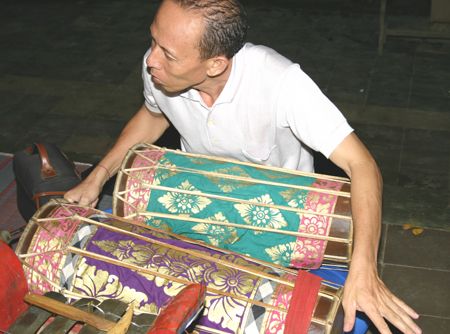Gamelan Concert
Gamelan Gong Kebyar "Taruna Mekar"
Tunjuk-Tabanan/Bali

The Balinese music form gamelan has been almost fully systematised and requires impressive virtuosity. In this performance, the ensemble—a true village orchestra—presents two traditional compositions along with new works, including a piece by musical director I Madé Arnawa. Arnawa has taught extensively in California and currently lives in the village. Two years ago, he completed five highly complex and novel compositions, which he then rehearsed for 18 months with the village orchestra. The result was so outstanding, both compositionally and in terms of performance, that it caused an international stir. Three of these works and one new work will be performed. As a guest composer, Oya Yukarya from West Java has rehearsed another new work with this ensemble, focusing primarily on the sounds of spoken language.
The Evening’s Compositions
"Perbawa" ( I Madé Arnawa , 2005)
This composition was inspired by the process of pounding rice with pestles in wood troughs, as well as by Dieter Mack’s concerto for percussion entitled Vuh. “Whereas with Vuh, the time structure is the foremost concern, I adopted and combined specific rhythmic elements that recall the process of grinding rice. The techniques were then adapted to the demands of a large gamelan orchestra,” says I.M. Arnawa.
"Lombo-Lombo" and "Liyar Samas" (traditional)
This works stem from various traditional repertoires of Balinese music. Lombo-Lombo belongs to a series of semi-ceremonial instrumental pieces that distinguish themselves primarily through their particular formal structure: the piece presented tonight is composed of eight small gong phrases, leading up to the sounding of the large gong. These works are generally comprised of a solo introduction followed by a longer main section, a fast, cyclical middle section, and an even faster concluding section with shorter gong phrases.
"Liyar Samas", which means “400 pieces of gold” and possibly refers to payment for a commission, is a composition by the famous musician I Wayan Lotring, who exerted a decisive influence on twentieth century music in Bali. The work was composed in the late 1920s. Originally presented as an instrumental prelude to a dance performance, the composition has subsequently evolved in a variety of complex ways to become an independent work. Lotring himself most likely contributed to this development, for he later taught the piece in different locations with significant changes. The work is comprised of a typical series of short, cyclical sections joined together by melodic transitions and, in part, derived from motifs in the main section.
"Komposisi 2" & "Komposisi 5" ( I Madé Arnawa , 2003)
Both works stem from Arnawa’s five-piece cycle Wak Bajera, which he composed at the end of his post-graduate studies in Surakarta. Komposisi 2 is a programmatic piece intended to describe, in an abstract fashion, women who are demonstrating in protest and expressing their sorrows. In addition to unusual phrasing, phase shifts play an important role in this work—a compositional turn with which Arnawa became acquainted during his study of American minimal music. Komposisi 5, in addition to being shaped by minimal music, is also influenced by Dieter Mack’s gamelan composition Crosscurrents. The main concern of the piece is the problem of combining two different types of musical elements—here, in particular, the combination of two different gamelan ensembles, each with its own tuning system.
"Idekeliher" ( Oya Yukarya , 2005)
In Sundanese, the title of this work means “loyalty”, “being prepared” and “general consciousness”. “Working with a Balinese gamelan gong ensemble was of course a great challenge, for I had never collaborated with one before,” recounts Oya Yukarya. “The typical and prominent use of dynamics, as well as the five tone system, served as my starting point. My fear of difficulties due to cultural differences disappeared immediately at the beginning of the collaboration. I was inspired by the professional demeanour of the Balinese musicians, and the feeling of cooperation was always evident.”
Programme
I Madé Arnawa: Perbawa (2005)
Traditional: Lombo-Lombo
I Madé Arnawa: Komposisi 2 (2003)
INTERVAL
I Wayan Lotring/traditional.: Liyar Samas (c. 1930)
Oya Yukarya: Idekliher (2005)
I Madé Arnawa: Komposisi 5 (2003)
Director of the group and indigenous composer: I Madé Arnawa
Guest composer: Oya Yukarya from Bandung
Within the framework of the Asia-Pacific Weeks, which are supported by the Stiftung Deutsche Klassenlotterie Berlin (DKLB).
